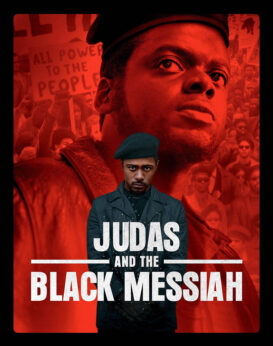
In the summer of 2020, the United States, as in much of the world, experienced an uptick in activism around the issue of racial oppression. The recent increase in police killings of Black people, exemplified by George Floyd and Breonna Taylor, was answered by the militancy of those who have simply had too much. Black Lives Matter has witnessed new political activism from scores of regular young Black people who became involved in campaigns against police racism, brutality, and abuse. These protests have reached a point of changing the consciousness of people across racial and national barriers.
 The film Judas and the Black Messiah, directed by Shaka King, with a screenplay by Shaka King and Will Berson and released in the middle of Black History month, shows how many in the late 1960s and ’70s in the U.S., and around the world reacted to many of these same concerns. The movie starts with the backdrop of the assassinations of Malcolm X and Dr. Martin Luther King, Jr. The main ideological leader of the Black Panther Party (BPP), Dr. Huey P. Newton, was in prison. The BPP, as many readers may know, was one of the most notable political formations to come out of the United States—a movement of Black militants who realized that political change could not come out of changes in presidents or Congress. It would require a revolution.
The film Judas and the Black Messiah, directed by Shaka King, with a screenplay by Shaka King and Will Berson and released in the middle of Black History month, shows how many in the late 1960s and ’70s in the U.S., and around the world reacted to many of these same concerns. The movie starts with the backdrop of the assassinations of Malcolm X and Dr. Martin Luther King, Jr. The main ideological leader of the Black Panther Party (BPP), Dr. Huey P. Newton, was in prison. The BPP, as many readers may know, was one of the most notable political formations to come out of the United States—a movement of Black militants who realized that political change could not come out of changes in presidents or Congress. It would require a revolution.
The common experience of racism was, they believed, tied up in the basic exploitative and oppressive nature of capitalism itself. The BPP developed an uncompromising revolutionary Marxist-Leninist political line. Inspired by Mao Zedong in their development, they based themselves on an understanding of self-reliant Black militancy.
The title refers to the concern of the FBI under J. Edgar Hoover (Martin Sheen), that a “Black Messiah” would be able to unite Black people in a revolutionary way. The film follows the true story of Black FBI informant Bill O’Neal (LaKeith Stanfield) tasked with getting close to a very charismatic Fred Hampton (Daniel Kaluuya), who became the Illinois Chairman of the BPP.
As viewers learn, Hampton was uniquely able to articulate a revolutionary socialist line that involved oppressed people of every color. He said that the oppressed had a common twinned enemy: The capitalist and the police who uphold capitalism. According to him, the capitalist comes in every color. Under his direction, the BPP reached out to build ties with the Patriots (predominantly lumpen whites) and the Young Lords (mostly Puerto Ricans). The movie has a brilliant scene in which the Panthers entered a Patriot meeting. A Confederate flag hung at the front of the meeting hall. Against the protest of some of his own cadre, Hampton walked to the front of the room and argued that the “rednecks” assembled there and the Panthers in the back of the hall were all oppressed by the same enemy.
The BPP were often known for their creative application of the Second Amendment, in the form of armed patrols of the police. One of the other strategies that exemplified them was their Maoist-inspired “serve-the-people” initiatives such as free breakfast and free medical clinics for the community. In a world in which children were going to school hungry and poor communities couldn’t afford medical care, their revolutionary approach was well received. It was that universality—and the ability to articulate a transformative revolutionary line that included reactionary whites with Black lumpen and workers in one anti-capitalist message—that made Fred Hampton a direct threat. Toward the end of the film, we see the police act with brutality and cowardice by murdering him as he was sleeping in his Chicago apartment. He was only 21 years old.
A couple of criticisms have been made of the film. Some reviewers have alleged that Hampton’s Communist message was soft-pedaled but I do not agree. Hampton is seen and heard quoting or displaying illustrations of Karl Marx, Mao Zedong, and Che Guevara. For a studio such as Warner Brothers to feature a Black Communist revolutionary in a positive way is actually quite remarkable. Other critics are concerned that the interaction between Hampton and the informant O’Neal was overplayed. This is a reasonable observation. There are many other ways to tell the story that would not have featured so prominent a role for such an agent.
It is inspiring to note that new groupings inspired by the original BPP have developed in the U.S., including the New Afrikan Black Panther Party and the Panther Solidarity Organization. Both of these formations include sections for different communities (Black, Brown, and White Panthers). As the 126-minute movie portrays, Fred Hampton, Jr. himself is working with various Panther clubs and organizations.
It is most refreshing to take a moment to consider that modern film studios are producing films like this at this time. Progressives, leftists, and all anti-racists can celebrate the new audience of viewers ready to hear this transformative message! The trailer can be seen here.












Comments